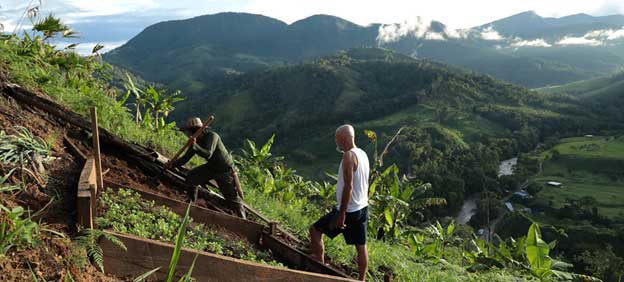Philanthropy’s Role in the Missing Global Architecture
Opinion
Marcel Arsenault is the co-Founder, CEO, and Chairman of One Earth Future, an incubator of peace programs around the world, a member of the Giving Pledge, and Founder and CEO of Real Capital Solutions.

Some former combatants in Colombia, have now turned to farming following the historic 2016 Peace Agreement. “The capacity of philanthropic individuals and organizations may be small compared to the United Nations and its 193 Member States, but what we lack in size we make up for in independence.” Credit: UN Verification Mission in Colombia/Marcos Guevara
NEW YORK, Sep 17 2020 (IPS) - The promise of the United Nations, as articulated 75 years ago, is a global system capable of managing global issues. As UN leadership knows, that promise is needed now more than ever in a multipolar world with increasingly complex challenges. This mission must be fulfilled, but is not possible without the collaboration of broad-based coalitions made up of innovative thinkers from all sectors of society working together.
When Colombian small scale farming entrepreneur Socorro resolved to give up growing coca for the drug cartels—despite the inherent personal risks and challenges she had to navigate in doing so—she needed something to substitute her income.
Socorro thought of fish farming, but since she lived in remote, rural Colombia, feed costs were simply too high. Socorro turned to an unlikely source for a solution: a philanthropist-backed coalition that combined ex-combatants from the Revolutionary Armed Forces of Colombia (FARC) with government agencies, foreign donors, civil society, universities, and the United Nations.
This coalition emphasizes a networked and market-driven approach to reincorporation of ex-combatants into civilian life, and aims to help rebuild communities impacted by the war in the process.
Through their collaboration, they had discovered that the nutritional needs of the fish could be met with locally occurring plants and agricultural byproducts. That knowledge—and the expanded circle of partnership—allowed Socorro and others in her community to make a good living and her coca substitution to be sustainable.
This one small example represents something much larger: how individuals across the globe can marry vision, resources, and coordination to support an important step towards the implementation of an internationally recognized peace agreement and winning the global fight against transnational organized crime.
It is also a microcosm of global governance that delivers effective solutions on the ground through collaboration. Philanthropy played a key role in this success, and this lays the foundation for other solutions to pressing global problems.
Because the fact is, while the world has indeed become more peaceful over the long run, we are in a dangerous moment. A mix of urgent global challenges, some acute like the Covid-19 pandemic and others chronic like climate change, are running straight into a rising tide of nationalism and xenophobia that makes all of these problems even more difficult to solve.
The world’s challenges are complex and interconnected, and getting more so by the day. Humanity keeps building, but we are missing architecture that is up to the task.
By architecture, I do not mean a building plan. I mean a global system for designing, implementing, and updating a multitude of plans. And philanthropy can play a major role in that system.
The capacity of philanthropic individuals and organizations may be small compared to the United Nations and its 193 Member States, but what we lack in size we make up for in independence.
We can take a genuinely global perspective, look at problems on their own terms, and iterate our way towards a measurable solution. And, when we find something that does work, we can systematize it and partner with governments to operate at scale. Just as venture capital can effectively “de-risk” investments for public markets, philanthropists can de-risk solutions to global problems for governments and international organizations.
The time is right, if not overdue, to move beyond individual plans, policies, and institutions and form a cohesive effort that is global, cooperative, and built around delivering real solutions to real problems.
That is why I am pleased to be co-sponsoring the UN75 Global Governance Forum. Along with a coalition of partners, including our co-Chairs Ban Ki Moon, Gro Harlem Brundtland, Madeleine Albright, Ibrahim Gambari, Mary Robinson, and Aya Chebbi, we are exploring ways to invigorate the world’s system of global governance and showcasing successful examples of organizations already doing so through inventive collaborations.
This type of initiative is needed now more than ever. Through more than 40 years in business and 15 in philanthropy, it has become clear to me that, if we continue to be haphazard in how we develop this system, we won’t get past where we are.
Covid alone has exposed the tragic limits of the system as it currently exists, and laid bare the urgent need—and promise—of a global system where a pandemic is seen for what it is, and is stopped dead in its tracks. As a business guy, I know a thousand to one payoff when I see one. I also know that other opportunities will come along, and billions in investment could save trillions in losses.
The United Nations cannot deliver this payoff on its own. A system that can truly match the complexity of the modern world can only come into being with the active participation of all of us, including philanthropists, civil society leaders, the private sector, government, the United Nations, and even civilians.
Now is the time for change, and I am hopeful that the UN75 Global Governance Forum (September 16-18) will be a window into what that change will look like.
tinyurlis.gdv.gdv.htu.nuclck.ruulvis.netshrtco.detny.im
